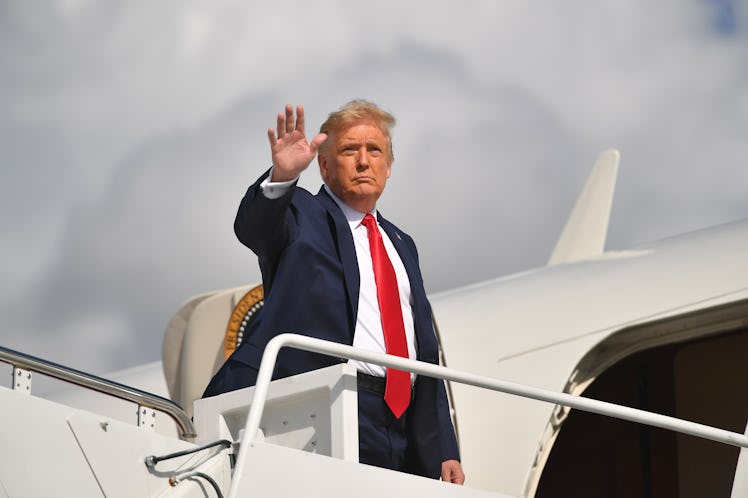
Here's What To Know About If Trump Can Be Arrested After He Leaves Office
President Donald Trump may be controversial for his policies, but he's also controversial for his personal practices — including all the lawsuits and allegations of misconduct against him. Given all that, in light of the upcoming 2020 election, you may be asking: Can Trump be arrested once he leaves office? The answer may surprise you.
There's a laundry list of alleged misconduct for which President Donald Trump could potentially face indictment, prosecution, and incarceration. The president has been accused of sexual assault by multiple women (he has denied all the allegations), been the subject of investigations into his financial dealings, and faced allegations of campaign misconduct, which the campaign has also denied. In many cases, investigations are ongoing. Although Trump became the third president in the history of the United States to be impeached by the House of Representatives in 2019, he was neither convicted by the Senate nor relieved of his presidential duties.
As long as Trump remains president, he is protected from being charged and convicted of any alleged crimes by long-standing legal precedent against indicting a sitting president. The Office of Legal Council (OLC), part of the U.S. Department of Justice, has long held that indicting or criminally prosecuting a sitting president would essentially incapacitate the executive branch, undermining its ability to "perform its constitutionally assigned functions."
However, once a president leaves office, that OLC opinion — and its protection — no longer applies. "One of the biggest reasons why Trump wants to win the election is to protect himself from indictment," Matthew Dallek, Ph.D, a professor of political history at George Washington University's Graduate School of Political Management, tells Elite Daily. "He enjoys the protections the presidency gives him from indictment in multiple ongoing investigations on tax fraud, campaign finance violations, obstruction of justice, and more," Dallek adds.
The OLC's prohibition on indicting a president is part of why in 2019, former Special Counsel Robert Mueller refrained from formally concluding the president had committed any crimes following a months-long investigation into possible obstruction of justice and collusion between the Trump 2016 campaign and Russia. In a 2019 press conference, Mueller said given the impossibility of charging a president with a crime, investigators had not considered charges an option. However, Mueller stopped short of exonerating Trump completely, stating in his report, "If [investigators] had confidence after a thorough investigation of the facts that the president clearly did not commit obstruction of justice, we would so state." In a Jul. 24 testimony before the House Judiciary Committee, Mueller then went on to note Trump could be charged with a crime once he left office. Nevertheless, the Trump White House claimed the report as an exoneration.
Dallek says a post-presidential criminal indictment is a very real possibility for Trump. "Any president enjoys a certain immunity from legal prosecution while they're in office," he explains. "However, once they no longer have those protections, they're subject to indictment like any other American who breaks the law is. The Mueller report was framed very carefully, as if to say 'If the president was an ordinary citizen, we would have charged him,'" Dallek adds.
There is some precedent for how a post-presidential indictment could play out. Should Trump decisively lose to Democratic presidential candidate Joe Biden in November, Dallek states Trump could potentially harness the power of the presidential pardon to recuse himself of his alleged crimes. "He could resign before his term is over and elevate Vice President Mike Pence to assume the presidency for a mere six weeks," says Dallek. This move would effectively allow Pence to grant Trump a pardon, much like the pardon Gerald Ford granted to Richard Nixon in 1974. At the time, there was more than enough evidence to impeach, and likely charge, Nixon for his part to coverup the effort to bug Democrats during the 1972 presidential election, which later became known as the Watergate scandal. However Nixon resigned before he could be impeached, and his successor, Ford, granted him a federal pardon for any crimes in order to end the national upheaval caused by the scandal. Since then, many political historians have characterized Ford's pardon as a "corrupt bargain" that disgraced the American presidency.
However, a presidential pardon only applies to violations of the federal code, not civil, state, or local offenses. Because of the nature of current and potential investigations against him, Trump could become extremely vulnerable after he vacates the presidential office. Notably, a president cannot pardon charges at the state level, which means states like New York — the site of many of Trump's pre-presidential business dealings — would more or less have free rein on any charges they wanted to pursue. There are currently multiple state-level investigations involving the president.
"Compared to previous U.S. presidents, Donald Trump is far more likely to face indictment after his term is over," says Dallek. "He's under active investigation on multiple fronts, which just hasn't been the case for any other former president besides Richard Nixon, who was pardoned by Ford."
Should Trump lose to Biden in November, how likely is it that a nascent Biden administration would either pardon the former president, or pursue charges? When asked in 2019 whether or not the Department of Justice should prosecute Trump after his term was up, Sen. Kamala Harris, now in the running for vice president, stated "they would have no choice" but to prosecute, and "that they should." Harris also added, "there has to be accountability." "Everyone should be held accountable," she said at the time. "The president is not above the law."